I had been alternating between feeling dread and intrigue about this day ever since we decided to visit Poland. As our train approached, I felt trepidation and restlessness. Perhaps Tigger felt it as well. Normally, he is pretty relaxed during train rides, but he was skipping and bouncing up and down the aisles of the cars today. The sun had come out for the first time in a few days as we walked from the train station. I could see the sign indicating the entrance from a few blocks away, and my heart almost skipped a beat. My mouth was dry. By the time we were standing before the gate, the bold German words above my head made me pause. I told myself I had to do this. I had to bear witness. And so I took a deep breath and walked past the gate.
It was unsettling walking behind the sturdy gates with its electrified barbed wires even though I knew I could just as easily walk out. I felt as though my footsteps were tracing tens of thousands of others who had even more reason to feel far more ill at ease and terrified than I did currently.
Being an ethnic Jew and part Roma, I had studied the Holocaust. I had read books, seen the horrible photos, and watched the movies and documentaries. In my role as a healthcare chaplain, I have sat before survivors as they shared their stories of survival. I thought I should’ve felt more prepared than I did, but seeing and hearing those things cannot match the experience of stepping foot on the soil of Auschwitz, one of the largest and deadliest concentration camps under Nazi control.
At least 1.1 million prisoners died here, and 90% of them were Jews. Out of all the Jews exterminated during the Holocaust, 1 in 6 died here and at the nearby Birkenau (Auschwitz II) facility, the main center of “the final solution.”
I was not sure about bringing Tigger to see this. He has a big heart and can be quite sensitive. Would the images and exhibits be too much for him? We discussed what he might see, and he was willing to view it. I have a firm belief that despite the monuments, documentaries, and museums around the world, these places need to be witnessed to more fully understand the evils of genocide.
In the end, I decided it was too important for either of us to miss.
Walking the grounds of the concentration camp was at times surreal. At times while passing between the red brick buildings, the sound of gravel crunching beneath our feet, I could feel a sense of reverent peace. In any other environment, I would be tempted to sit and enjoy the calmness.
Then I would walk by the gallows from which a dozen Poles were hanged in reprisal for the escape of 3 prisoners. The officers at Auschwitz were big on “sending messages.” Public hangings and floggings were common. If a Polish prisoner escaped, their family would be arrested and brought to the camp, and they would remain there until the fugitive returned.
Many of the blocks, the brick buildings which housed prisoners, now house exhibitions. The Roma victims have their own exhibit. I had known the Nazis included the Roma among the ethnic groups, like Poles and Russians, that needed to be eliminated. However, I did not realize that out of the 23,000 Gypsies who had been brought here, only 2000 survived.
Other exhibits are memorials to the various nationalities of prisoners. Some of them are even more painful as you see the living conditions, the articles left behind, and as you read about the “justice” many of the prisoners experienced. While many prisoners died from the gas chambers or other executions, many more died from exhaustion, severe hypothermia, medical experimentation, and starvation.
I’m not sure I will ever forget my experience of walking up to Block 11. This prison building was used to reeducate some of the prisoners and to mete out justice for infractions such as assisting someone’s plans for escape or maintaining contact with the outside world.
I initially walked up to 2 gates to take a photo. I then peered beyond them and saw the wall that I would later learn was called “the death wall.” Its energy drew me in. I could not break eye contact with it as I slowly, almost reverently, approached it. The grey surface of the material of the wall stood out starkly against the red bricks. Small offerings lay at its base. I knew without seeing a plaque or anything else that this had been a wall for shooting people. Tears welled up in my eyes, and I resisted the urge to touch it. Unlike other areas of the camp, this spot had . . . presence.
Its tragedy spoke to me. I asked it “Why?” but only silence answered me. This type of evil just can’t be explained.
I walked away from the wall, but the wall did not leave me.
We continued to explore the grounds and the various buildings. I made sure to engage Tigger in the exhibits so that he would have a deeper understanding of the darkness that once reigned here.
After leaving the camp, I headed to the bus stop for the shuttle to Auschwitz II-Birkenau. However, the prospect of boarding that bus made me freeze. I turned to my son and said, “We have two options. We can take this bus and go to the other camp called Birkenau, or we can take the other bus and head back home.”
I will admit to feeling relieved when he replied, “I can’t take another concentration camp. Not today.” Neither could I.
In my years of working in trauma, intensive care, and of traveling all around the world, I have seen many things. I have witnessed amazing things and horrifying things.
But nothing has left me so thoroughly shaken as Auschwitz. Hours later I keep asking myself “But why? How could any human do such a thing?” I don’t understand it. I don’t think it can be understood.
After about my 3rd time of saying this aloud, Tigger finally said: “I guess humans were just more evil back then.”
But that’s the problem. Despite all the beauty and great kindnesses in the world, there is a blackness in some people’s heart. We see similar things taking place on the African continent today. In the 90s, we saw it happening again in Eastern Europe.
And just like in the time of the Nazis, there are many governments who turn their head away from the plight of these people.
This is why we bear witness. This is why these places, no matter how painful and difficult, must be visited. The ghosts of Auschwitz have left an indelible mark on me. The death wall still speaks to me. “Never forget!”
No, I cannot. And we must not.

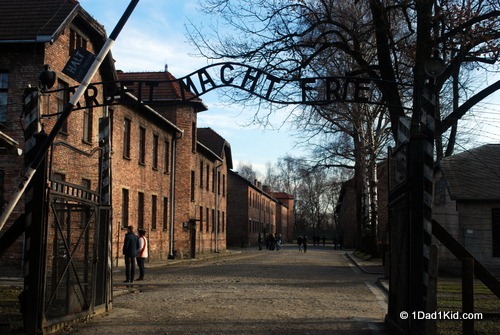
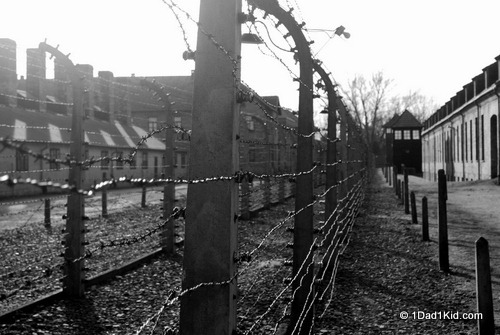
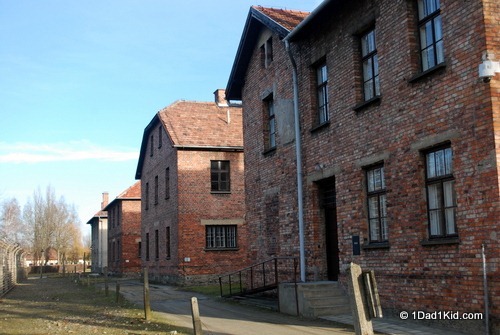
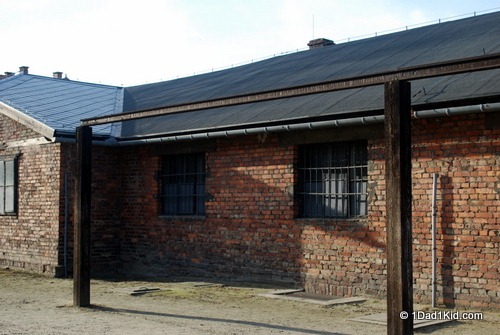
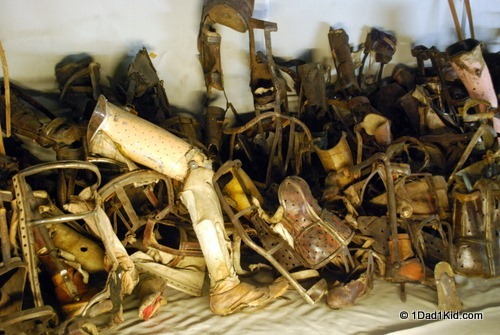
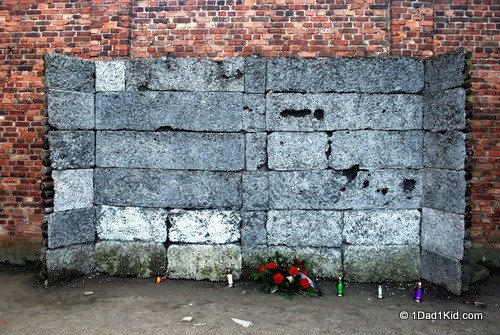
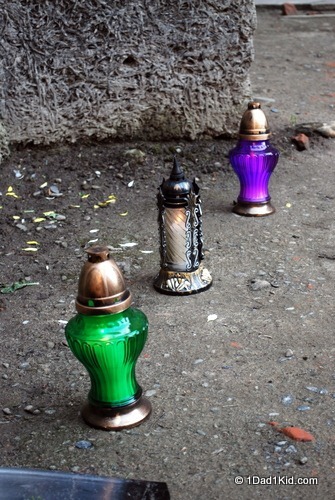
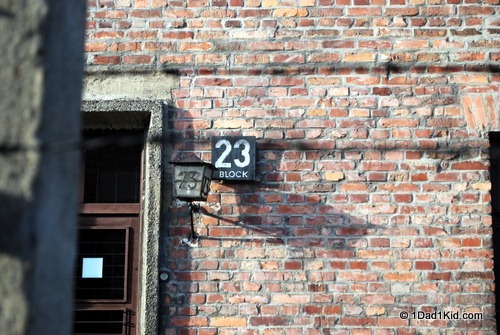
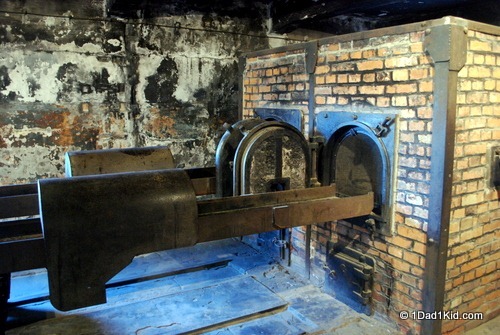
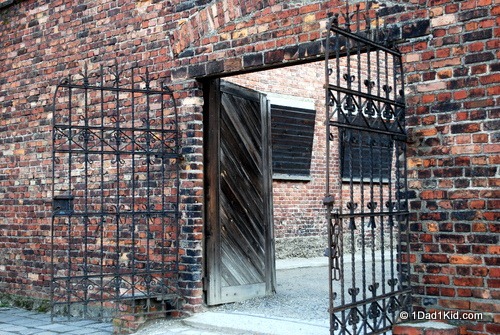


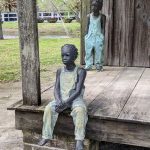

January 13, 2017
Wonderful post Talon. This is something that must never be forgotten. I felt the same on our visit to the Shoes on Danube in Budapest. Let’s hope history never ever repeats itself.
January 13, 2017
Yes, that was a really strong memorial as well. We visited it a couple of times when we lived in Budapest.
August 16, 2015
An excellent post Talon, capturing the horrific reality of Auschwitz, that this was something that happened, and the profound effect it has on visitors. You convey just how essential it is for all of us to see it with our own eyes, feel it with our fingers, and know that people have the capacity to commit such terrible crimes against other people.
August 23, 2015
Thank you! It was an incredible experience that affected me for days afterward. Hard to write about it. Definitely an important experience for people, though.
January 28, 2015
I’m totally with you Talon, no matter how strong the experience of visiting such places is, we have to keep visiting them to keep remembering and not to forget.
January 28, 2015
Absolutely. There is too much danger in complacency.
June 15, 2014
Glad to read this, as we prepare to visit in a couple weeks. And thanks for the book recommendation, Cat.
June 15, 2014
I have a tips post for visiting there that may be helpful to you. Try not schedule too much else for the rest of the day. It can leave you effected for quite a while.
May 4, 2014
The black and white photo is definitely very disturbing, maybe I watched Schindler’s List too many times but everything is way scarier when it’s B&W.
🙁
May 6, 2014
It definitely adds a strong emotional component.
February 1, 2014
We visited Auschwitz many years ago and Dan and I both say that we’ve never been the same since. Although we had seen Soviet and Nazi camps in Latvia and Lithuania previously, there was something about the precision and deliberateness of every part of the killing process in Auschwitz that is different and seeps into you.
We took a tour of Auschwitz from an older Polish man who used to live in the village until his family was deported when the camp was built. He ended the tour by saying that we think of this happening “in the past” but the importance of visiting Auschwitz today is to understand that genocide is still occurring around the world and we can’t stay complacent.
February 3, 2014
So many people think it was just a thing of a past, and unfortunately it is happening today still! We as an international community need to do so much more about these horrible situations.
January 20, 2014
It’s important that places such as the Auchwitz memorial survive as a reminder that systematic government-sanctioned slaughter is an unspeakable evil. If it were easy to visit such places that would defeat their purpose. That said, I’m with Tigger. One such horror makes an impression not easily forgotten. I can’t imagine seeing two in one day.
January 21, 2014
Yeah, I don’t think I could’ve handled Birkenau after this. And that place had even more atrocities. The experience affected me for days.
January 20, 2014
I can’t imagine how I would feel in visiting this place. The Holocaust was certainly one of the darkest days in human history. I agree we mustn’t ever forget, otherwise we run the risks of repeating our mistakes.
January 21, 2014
Most certainly. And the more time goes on, the greater that risk grows if we allow these incidents to slide backward in our memory.
January 20, 2014
Sites of extreme tragedy are hard for me to visit. I’ve been to NYC over 10 times since 9/11 and yet I’ve never gone to the site of the towers. Thank you for sharing this incredibly touching post about Auschwitz. I’m not sure if I would be able to go there.
January 21, 2014
It definitely is tough. I’ve been to other memorials, including some tragic ones, but this was a lot more intense than anything I’ve ever experienced.
January 18, 2014
So powerful. My dad visited here, too, and was so moved. The mom of a friend of mine was in Terezin – we NEED to remember these things, and make sure we stop them from happening again. Thank you for writing this.
January 18, 2014
Yes, as awful and hard as they are to remember, we simply must. Too much is at stake, and humanity has already proven its limits.
January 16, 2014
Talon, I didn’t want to read this, I knew it would stir some emotions. Very well written and moving. I recently attended an event here in Dallas, nothing like this, but it was a memorial to something horrible that happened here in the past. It reinforced in me as does your story, this is why it is important “to bear witness” and never forget. Only by studying the past can we understand how to change our future for the better.
January 18, 2014
So important to keep the memories of these things alive. The further we get out in time from these events, the easier it is to forget. Some things just should must never be forgotten.
January 16, 2014
Thank you and Tigger for being witnesses. You are so right, we must never, ever forget.
January 18, 2014
Never ever!
January 15, 2014
Wow – your photos make me speechless. Very powerful photos and words…
January 15, 2014
Thank you! It’s hard to do justice to it all.
January 15, 2014
A wonderfully written and touching post Talon! I think you did a fantastic job of putting your feeling into words…something we had a hard time doing after our visit. The acts that went on in this place are unimaginable and incomprehensible. I know many people questioned our desire to visit Auschwitz, as I’m sure they did to you as well, but it is unquestionably one of the most important sites we have ever visited. I know we will never forget some of the images we saw, but this is certainly a good thing.
I think the thing that surprised us the most was the ethereal and haunting beauty of the place. The trees and brick buildings make the place seem almost beautiful…but perhaps this is the point. Glad you got to visit and glad you “enjoyed” your visit as much as one can at a place like this. Hopefully the rest of your time in Krakow has been much happier! Safe travels!
January 15, 2014
Yes, that was such a bizarre juxtaposition. To have all this apparent beauty mixed with such horror was so bizarre.
Our other time in Krakow was pretty good. Thanks!
January 15, 2014
Having known survivors made your connection much more intense and personal, I’m sure. Most visitors would go through and only know of anonymous predecessors. You have he ability to say “Mrs.So and So was here in this very hallway”, and to be able to picture them there, and what they endured. I don’t know that adequate preparation for that is possible.
January 15, 2014
Yes, the connections and history definitely had a stronger impact.
January 15, 2014
Wonderful post, Talon. Though I can’t say I completely understand everything you shared here (not having the same ties that you do), I did feel similarly to what you express when we went and visited Tuol Sleng 21 in Phnom Penh, Cambodia. It was incredibly hard to walk on the grounds of a former school that had been turned into a prison and death camp, to stare at portraits of so many innocent people who had been killed at the hands of a ruthless regime. But I felt that it was not just an important part of the country’s history, but our shared history as the human race, and it was important that those people’s lives had not been lost completely in vain. By standing there and facing the truth of what happened, I felt it was the best way to honor the many lives that had been lost. Hopefully if enough people walk in those shoes, there may come a day when places like these really will be a thing of the past and live on only in memories of what must never happen again.
January 15, 2014
I hope we see the day when these atrocities are only history. Nothing would make me happier.
January 15, 2014
We know feel we’ve been to Auschwitz after being moved by your descriptive powers, Talon. But we’re now even more resolved to physically go there. It’s our responsibility as travellers; our duties as human beings.
January 15, 2014
I definitely agree! And thanks for the great compliment.
January 14, 2014
Impressive, powerful and I agree with you, we must bear witness and NEVER FORGET what happened there and NEVER LET THAT HAPPEN AGAIN.
I am still thinking how I will ever be able to visit a concentration camp, but we must bear witness.
January 15, 2014
It is definitely tough but so important. I just wouldn’t plan too much else for the rest of the day. I really needed that extra time to just process.
January 14, 2014
What a description. I felt like I was feeling your feelings when I read this. It sounds very traumatic and I can’t imagine the energy there. Thanks for sharing this with us.
January 15, 2014
Thanks, Val. It was quite intense and very difficult to put into words.
January 14, 2014
Very powerful Talon.x
January 15, 2014
Thank you! It was an incredible experience.
January 14, 2014
very powerful indeed. I agree that we absolutely need to visit these places. We took both our kids (9 & 11) to the S21 site and we don’t regret it. After much discussion and explanation of it’s history, they solemnly absorbed the site. It definitely opened up a new arena of questions. We asked our son to write a blog post about his experience but he absolutely refuses to ‘write about something so horrible’. It had an impact, for sure. Lesson learned, let’s not repeat history. Thanks for sharing your experience, Talon. It was beautifully written for such a horrifying place.
January 15, 2014
I can’t blame your son. I’ve heard from other bloggers who said they couldn’t even manage to write about their experience either. Some just did a photo essay, others just didn’t write up. I wasn’t sure I was going to be able to either. Just so hard to put into words.
January 14, 2014
Wow, what an impressive story. Especially when you visit these places with kids. We did the same when visiting the Killing Fields in Cambodia, very tough. They kept on asking questions days and even weeks after the visit. It makes an impact but it is so important to show it.
January 18, 2014
They definitely impact you. I know I was processing it for days. So important for kids, too. Our generation wasn’t that far removed from these atrocities, but each successive generation moves further and further away. We have to make sure they know.
January 14, 2014
I agree – we need to remember and hopefully learn from the past. I had a somewhat similar experience recently when we visited the slave mart in Charleston, SC. I’m still processing.
January 18, 2014
I wish we could get more of the world learning from these horrible events. Unfortunately, they still happen but on a smaller scale and with perhaps a tiny bit less cruelty.
January 14, 2014
I know exactly what you mean — it’s important to spend time at sites like Dachau. World travel isn’t all tropical 5-star resorts and ski-in ski-out mountain lodging. But it’s hard man, so hard.
January 18, 2014
Incredibly hard. It affected me for days after.
January 13, 2014
I, like you, believe it’s our responsibility to visit sites such as these. We shouldn’t just visit all the nice and pretty parts of a country but should also learn of its history as hard as it may be.
January 18, 2014
Most definitely! Travel isn’t just about the pretty parts.
January 13, 2014
I visited Dachau in 2012 and it was a very unsettling experience. It was bitterly cold and no birds were singing in the camp. I felt a very strange dark presence, like it was holding down on my chest.
I’m glad that I visited it and learn’t more about the horror that happened all over during WW2. I took photos and I can barely bring myself to look at them, especially the ones of the incinerators.
There was a memorial there which said something along the lines of ‘lest it happen again’, our guide wouldn’t take us there because it has happenned again all over the world and it is happening right now.
January 18, 2014
I thought the lack of birds chirping was quite unusual, too. However, until today I haven’t been around any birds in Poland that are singing. Perhaps the ones that sing are more dormant in the winter or something.
January 13, 2014
This was very similar to Dylan and I visiting the Killing Fields and prison in Cambodia. I remember thinking, how could something the same as me (human) be capable of this type of brutality? It is so very hard to undrestand yet like you I believe we need to bear witness. It is too easy to forget these things when you only read about them in a book. To go, see, and feel the environment leaves a mark that can never be forgotten!
I am so glad you both had the opportunity to go, no matter how hard these types of things are I always walk away feeling grateful for the perspective.
January 18, 2014
Yes, I’m very grateful for it as well. It is so mind-boggling how anyone could do these things to another living being.
I agree that visiting these sites is so much more powerful and has such a greater impact than watching documentaries, seeing the photos, etc. It’s so different actually standing in the spot.
January 13, 2014
This gave me a taste. I’m not sure I’d want to go there either, but given the chance I probably couldn’t resist.
Thanks for sharing Talon.
January 13, 2014
It’s definitely a tough place to visit. I’m glad we went. Tigger is still talking about it which says something. It’s a hard visit but so necessary I believe.
January 13, 2014
This reminds me of my visit to Terezin, a concentration camp near Litomerice, in the Czech Republic. It was a harrowing place, and there were very few people visiting when I was there in January. I wandered down a passage where, at the end, there lay a massive, black metal door with spikes all over it. I’m not sure what it’s function was, but it made me feel queasy – I turned and ran.
You’re right in saying that it’s important that we don’t forget. There’s been no genocide on the same scale since WWII, but that doesn’t mean that it hasn’t happened in countries like Rwanda, Georgia, and the former Yugoslavia.
January 13, 2014
Wow! Did you ever do any research to try to find out what that door had been used for?
Yes, we have unfortunately seen that the world has not completely learned the valuable lessons from WWII. It’s incredibly sad.
January 16, 2014
I have also been to Terezin, and met one of the cleaning staff of the ghetto. He was speaking to me in Czech as he cleaned around the furnaces and broke down and wept. I have no idea if he is a survivor or is just as stunned by the atrocities as I was (and I am a WWII fanatic). It has stayed with me since.
I just read the Zookeeper’s Wife, about the wife of the Warsaw Zoo’s head zookeeper, during the occupation. Really uplifting story – you might like it.
January 18, 2014
That Terezin experience sounds quite powerful!